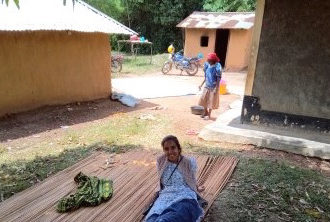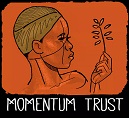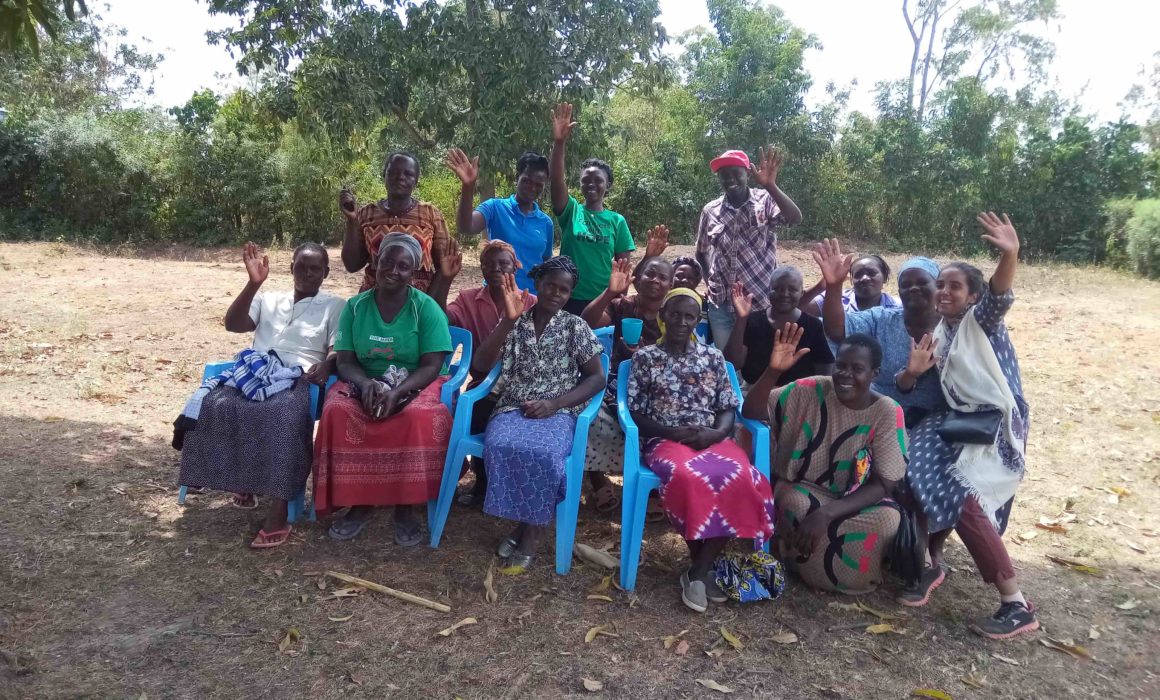I stepped into Kenya as the new intern Shraiya Singh – a nervous 21-year-old graduate from India; flipping through my readings and preparations for working with farmers in Kenya, googling about where to find Indian food and air conditioned rooms in the closest city from the village where I was to be situated; worrying if I will be able to adjust and do justice to the challenging work environment.
For about 12 weeks, I lived and operated from Siaya – the village which breathed life into Momentum Trust’s objective of uplifting impoverished farmers 6 years ago; worked intently in Busia – the village which Momentum Trust’s largest number of Chia farmers call home; and visited Ndhiwa, Homa Bay – the village where I was a part of establishing a promising Chia farming partnership between Momentum Trust and Kenya Elimination Poverty Network for Aids affected farmers. I have formed refreshed impressions about how resource rich regions and lifestyles dependent on nature challenge systemic poverty and preserve the rare values of community living and a life in harmony with the environment.
In this blog, I proudly present the experiences of Millicent Anyango – a Luo tribal name lovingly given to me by farmers as a sign of accepting me in their lives. For me, it reflects stretching myself to a new personal and professional level, a testament to the strong meaningful impact farming societies have had on me.



A new life in a new soil: Learning the value of simple living in a vibrant environment
There are countless things that I have come to appreciate about Siaya and Busia, and countless things these villages have taught me.
First is the wonderful habit of greeting everyone around, strangers and friends alike. Being a Mizungu (foreigner) attracted a lot of attention whenever I was passing through the streets on a boda boda (motorbike). Pleasantly, that attention was always warm and friendly, expressed in a wave with a wide smile or a cheerful “Abaari Yako!” (How are you today!)


The structure of working with farmers in groups encouraged collective responsibility towards cultivating land. Repayments were collected together, the land was tilled together, and the completion of farming was celebrated together with bread and cups of tea! A sense of belongingness, camaraderie and commitment towards the group’s members is cherished, where one person’s happiness and troubles are shared by all. Engendering this community feeling ensured the development of not an individual, but a close-knitted culture of farming in the village as a whole. Traditional knowledge is preserved while inculcating modern agricultural practices.


As the most common venue for the weekly group meetings, the shade under vast old trees was my most favourite lounging place. Having the farms and house gardens as our workspace was the most refreshing and calming experience, away from the hustle and bustle of city life. I got to interact with farmers about their lives and families sitting in a stark scenery of gaping mountains and river streams meandering through the fields. When it is time for repayment collection and farming training, that very shade under a tree turns into our office and our classroom.


Door to door visits to farmers’ houses exposed me to the daily life and happenings of our farmers. I’ve come across numerable farmers who brilliantly put savings together to repay their loans while supporting large families. I’ve learnt to enjoying simple pleasures like cherishing the free flowing wind on a bright sunny day. Most of the farmers also have multiple pets, poultry, cows and sheep, who are integral and respected members of the family, equally entitled to a seat on the sofa or a bite of the maize harvest. I experienced a society which strikes an equilibrium with all forms of life and holds its essence in coexisting in the ecosystem. Even in times of scarcity, sharing was a joy, a value that still prevails.



Music is as much a part of the soul of village life, as is Ugaali (the staple diet made from maize, loved by all). I woke up everyday to the sound of funky beats from the beauty parlours next to my lodge. Time spent working in our office in Uhuru market was never boring as the neighbouring metal workshop has an enthralling playlist of Luo music playing all day long. When it’s night and the sky is lit with stars, the market places continue to live out loud and swing with music. Even the Matatu rides (shuttle service between regions) reveal to you that Kenya can never stop being green and musical.
Working with the staff: My pillars of guidance, and my most treasured Kenyan friends
Like the people of Siaya and Busia made me feel welcomed, so did the staff of Momentum Trust. On meeting them, I realised they are the Avengers of their villages; implementing everything ranging from strategies for swift yet sensitive repayment collection, engaging farmers in well informed training sessions, nurturing direct relationship with farmers on their fields, as well as meeting the ever growing challenges and opportunities of a new rain season.


In my time here, we developed a new restructured and sustainable loan model for Siaya encouraging balanced production of a food crop along with cash crop (Maize along with Chia). Conducting a social impact survey and developing sessions to promote responsible savings strategy were two tough but rewarding exercises. In Busia, I assisted in building and implementing a plan of action for Long Rains 2019 for Chia farming: the anchor of our relationship with farmers in Busia. It was a thrill to help in organising an expansive Chia awareness drive where farmers introduced multiple villages and towns to the benefits of the crop; another exciting new venture was building a valuable new partnership in Ndhiwa with an impactful and inspiring organisation that shares our passion for empowering farming, farmers and their families.
More interestingly, the team and I developed a warm friendship by bringing our varied cultures into dialogue over our shared love for tea, food, cinema, traditions that inform our lifestyle, farmers’ issues and women’s role in both societies. Momentum Trust became a bridge of connect between two different civilisations, celebrating differences, and exploring creative solutions to common problems.

Caleb’s empathy and professionalism, Joseph’s valuable experience with the village dwellers and agricultural training, Paul’s knowledge of the fields, Faith’s connect with the farmers, Washington’s passion for farming a diversity of crops, Philip’s exceptional multitasking skills as a trainer – I’ve a lot to take back from each of my friends.


What Kenya meant for me: From a challenging project to an incredible journey full of personal reflections and professional growth
When we explore new parts of the world, particularly the roads less travelled by, we explore new parts of ourselves as well. It was definitely not a smooth sail or an easeful affair. When every day presents you with a new hurdle in the work sphere, it is an enriching process to negotiate a resolution and solve problems as a team, keeping the farmers’ interest at heart.
The transition from Shraiya to Millicent was the creation of this supportive environment and warmth I received from the community. This internship provided me with a medium to test my passion and commitment to rural transformation, learn how to tackle the real impediments to sustainable responsible agricultural development, and make my skills useful and sharper by getting the space to design solutions, proposals and interventions.


More than a majority of farmers working with Momentum are women. It was inspiring to see the female agricultural force as engines of change and progress within the family and outside it. I have witnessed groups initiating innovative income generating and savings activities like pig breeding in Asere and Tebo banking in Uyore. This resonates a powerful truth brilliantly put by one of my colleagues, Caleb, who I dearly call my Okello brother :
“Poor people are usually looked at as helpless, vulnerable and not literate enough to advance. However, reality reflects that the experience of poverty makes them more active in taking risks, being creative, smart and thinking individuals since survival is at stake. This knowledge of surviving, adapting, building resilience and alternatives is best known to a poor person.”
The most precious of all learnings has been the exposure to what it means to be a farmer. Whatever a farmer sows and works on, the soil selflessly gives back to her. The toil never tires a farmer down since the reward is food, nourishment, an invaluable asset. Working tirelessly to make life sprout out of the earth, the plant has the soul of the farmer in it.


This village has left an indelible print on me and living here, I got to make my own extraordinary story. The great walks through the fields, the golden sunset, the amount of effort put towards building trust and results, the days that began with tilling the land and planting a seed with Momentum farmers; the feeling of being a part of something bigger, of adding value to other lives, the realisation of having found a place to call home and new bonds to cherish, the experience of it all will remain aglow in my mind. Millicent Anyango will thus leave you with ages old Kenyan wisdom that she imbibed here:
“If you want to go quickly, go alone. If you want to go far, go together.”

Shraiya Singh, Momentum Trust intern

